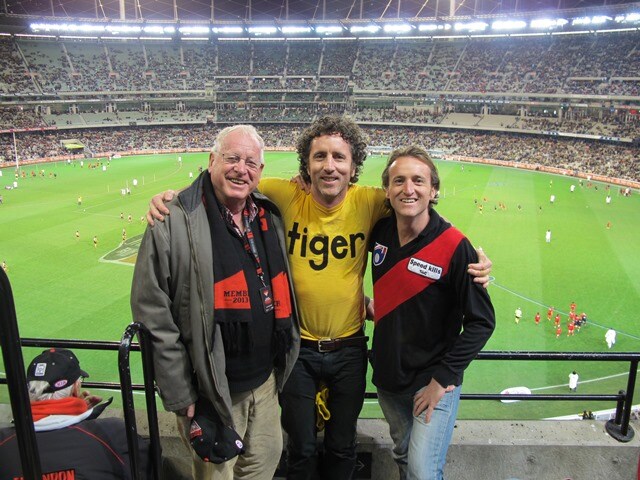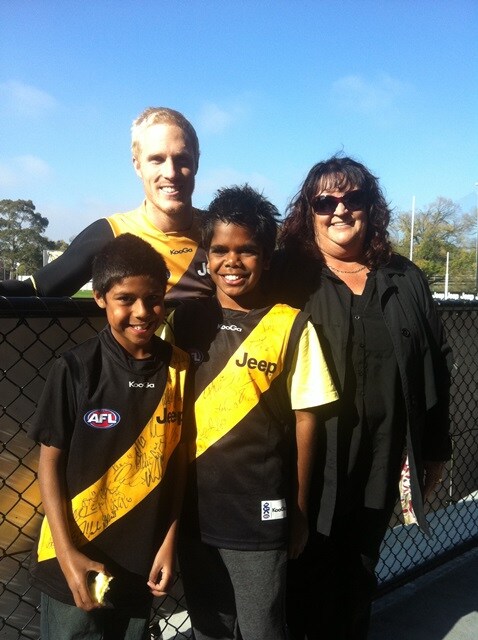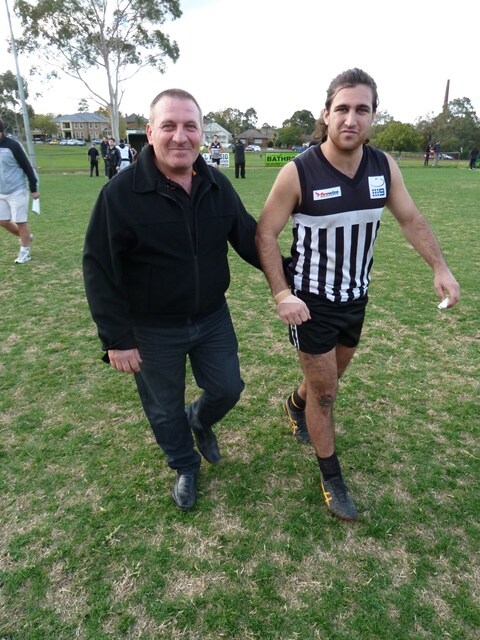“I didn’t have a team until I met Hugh,” says my sister-in-law, Zoe, a botanist on a weekend home visit from Roxby Downs, where she kills feral cats, monitors tailing dams and sprays weeds – now sitting in a top tier of the MCG beside my brother in his Essendon jumper. “Our first date was the Dreamtime game four years ago. I’d been to one other game before that. I’m not really a football person.”
They say love is blind, and for some it comes in the colors red and black.
Sports writer John Harms, in an article published in the(melbourne)magazine early this year, wrote of the sense of self that comes with following a particular football team. For many, who we support is part of our very being. Harms barracks for Geelong, like his father before him, and surmises that family, geography, friends, teachers, a great player, an act of rebellion or independence, wanting to belong, and the colors, are all reason enough to choose who we follow.
For most, like my brother, following a club is a birthright. As social commentator Catherine Deveny tweeted before the 2010 Grand Final: “If Collingwood wins in 9mth time there will be an epidemic of babies born with mullets, lovebites and neck tatts called Jaidyn.” The put-down is in the inherited Collingwood gene.
I was born in 1970, mid-winter, during the third quarter of a Richmond win against Hawthorn at the MCG (although St Kilda, Footscray, Essendon, Collingwood and Carlton won also that day). I cannot remember knowing about football until grade two, when our family moved from the country to Melbourne. My school was within the suburban ambit of Hawthorn, the reigning premiers with stars like Peter Knights, Leigh Matthews and Don Scott. Most other children barracked for Hawthorn. My father went for the Dons. My eldest sister adopted the team that won that year, North Melbourne. My mother and other older sister – they were oblivious to it all.
Then, one Monday morning, I opened the sports pages of The Age and read the headline ‘TIGERS EAT ‘EM ALIVE’ and the die was cast. It was August 15, 1977 – nine months before my brother was born – and Richmond beat Geelong at Kardinia Park by 86 points. I was seven, and from then, I was to be a Tiger for life. Why wouldn’t you pick a team so ferocious it could eat its opponents?
Last week, I sat down with my father, David Jellie, to record his stories about football, and learned things about him I never knew. I had known as a teenager he was a ruckman for the Colac Tigers, in the Hampden Football League, playing against Camperdown, Terang, Cobden, Mortlake, Warrnambool, South Warrnambool and Port Fairy. He won silverware, and later moved to Melbourne, where he played two reserves games for Hawthorn, before buggering his knee and giving it all away to study in England and start a family. I have seen yellowed newspaper clippings; I know he was a player.
What I didn’t know was that his first captain-coach in the Colac seniors was former Carlton centre-half-back Vin English, and his second playing coach was John Beckwith, the five-time Melbourne premiership player who captained the winning teams of 1957 and 1959. My father also said that in 1958, as a raw-bodied 17-year-old, he was invited by Collingwood scouts to the VFL Grand Final, and into the jubilant change-rooms afterwards. “That’s where I met Neil Mann, Collingwood’s former ruckman, a real gentleman of the game, who shook my hand, and his hands were like a bear’s paw.”
Then, in 1959, with Colac boy Don Nicolson, who that year played five games for two goals with Essendon, he was invited by the Bombers to the Grand Final, which they lost to Melbourne. “After the game we went to one of the players’ houses,” says dad. “Their captain, Jack Clarke, was there with some of the others, just sitting around having a quiet drink. It was the most low-key thing you could imagine.”
Later, when my father was studying civil engineering at Gordon Technical College, he was invited to train with Geelong, joining the Lord twins – farm boys from Cobden – and others he knew from the windswept ovals in the Western Districts. But his heart wasn’t in it. “My ambition was to play for Colac,” he says. “I didn’t think of anything beyond that. Colac was the centre of my world. I rarely came to Melbourne. The football down there seemed a world away.”
**
On Saturday night, under a harvest moon, I arrived at the MCG to the sound of clap sticks and the smell of hot chips, and saw a man in the outer dressed in a possum skin coat with a didgeridoo. Not five minutes later, in a narrow corridor near the Long Room, I encountered Tony Abbott, in a crisp white shirt, and turned my back on him to show him the five black felt letters stitched on my yellow top that represent my team, and exclaimed: “Go Tiges!”.
He looked puzzled. He patted my shoulder, and asked “How are you, mate?” to which I offered no reply.
I had more important business at hand. The ball was soon to be bounced. And, on Saturday night, I was to meet with my father and brother. Because of age differences, and all the years I’ve spent away, for the first time in our lives the three of us – the Jellie boys – were to watch a game together.
**
Leigh Matthews, at 19 years of age, became a father and won the first of his eight Best and Fairest awards at Hawthorn. Celebratory beers were rarely part of his post-game routine. His teammates went out for a drink; he went home to his wife and daughter. For him, football was a job and, as a young man, he had responsibilities greater than himself.
Like most other football followers, I have theories on the game, and one is that the best teams have players who are fathers. Show me a professional footballer who has children, and I will show you somebody who’s playing for keeps. Once you’re a dad, as all dads surely know, your life is no longer yours alone. Risks are measured with rewards. Responsibilities take hold. Perspectives change. All at once you are more vulnerable; but also more selfless, and more attuned to the needs of others.
A reason I like Orren Stephenson as a player is because he has three children. I’ve learned recently, also, that Shane Tuck is a father. If I picked the Richmond team, all things considered, these two would be in it. Has anybody ever questioned their effort and endeavour? Has their work ethic ever been queried? Hardly would there be two more blue-collar, hard-working and unfancy footballers on Richmond’s list, who keep their head over the ball, knowing it’s part of a job description that helps keep food on the table.
Likewise, Chris Newman has announced recently he is a father-to-be, and his past two games for the Club have been among his best for the past two seasons. Nothing quite focuses the mind like an impending child.
I mention this because Troy Chaplin, last week, became a dad for the second time, and on Saturday night he was Richmond’s lodestar. He bustled and bullocked all night and rarely was beaten. He beat Stewart Crameri with his body work and a defensive punch. He won the ball ahead of Michael Hurley. He beat Jobe Watson in a marking contest, and then Tom Bellchambers. And, halfway through the third quarter, when somebody from Richmond needed to stand up and do something –anything – to arrest the game’s outgoing tide, he flattened David Myers in a tackle, body-slamming him deep into the MCG greenery.
On a sparkless night in Tigerland, under a watermelon moon, here was a moment that at last roused the crowd, bringing hope for those in Yellow and Black, triggering defiance and refusal, and promising to ignite something to break a circuit.
I wrote in my notepad “accolades for Troy Chaplin” and thought then how I had met his parents after the Melbourne game, and they had said they wouldn’t be going to the Dreamtime game, opting instead to drive to South Australia to watch their youngest son, Jarred, play for Mount Barker in the Hills Football League A grade competition. They have two boys, and they share their love between them.
On Saturday night at the MCG, no one else on the ground took more marks or had more game time than Troy Chaplin. If any player were to have an excuse for a poor night it was him, with all the disruptions wrought by a newborn. But no other Richmond player was as steadfast in his resolve. No other player stood quite as tall. No other player had such a tangible personal motivation to succeed. It was a delight to behold.
**
On the Friday before the game, I rode my bicycle through falling leaves to Punt Road Oval and from across the fence wished Sam Lonergan the best for his Tiger debut. I saw Jack Riewoldt’s father, and met a woman from Victor Harbour in South Australia, who grew up in Mildura and had flown across for the game with her two Aboriginal foster children. I took a photograph of the three of them posing in front of Steve Morris. He’s such a good sport, such a team player.

As the crowd dispersed, Loui Conca said hello. He had booked tickets from Perth before his son Reece injured his foot. He was seeing the game on Saturday night, but in the afternoon was to watch his eldest boy run around in the fourth division of the Eastern Football League, in a game of suburban footy played by old brickworks in Surrey Hills. He invited me along.
After the training session I rode up a hill on Yarra Park to look for a tree Martin Flanagan wrote about in Richo, his biography of Matthew Richardson. It’s a scar tree, that stands like an ancient Greek statue behind a rusted picket fence and before a plaque that tells of its significance to the Wurundjeri people. Here are the etchings of industry of this land’s traditional custodians; its scar made when Aboriginal people removed bark to fashion canoes, shields, food and water containers.
I walk around the tree, trying to touch it, to pay respects, as if it’s an embodiment of a greater spirit. The moment and this place I have all to myself. There is stillness, calmness, in the air, and on this high ground I find perspective. Below are the red bricks and green grass of Punt Road Oval; to the east is the gothic bluestone spire of St Ignatius Cathedral; and to the west hang city buildings that rise like totems to a god of commerce.
I think of the Aboriginal men I have played football with, I think of my brother-in-law who is of the Mitchell River people, I think of my beliefs, but I think mostly of Shane Edwards and Saturday night and the Richmond Football Club. There is nothing quite like the anticipation before a big game.
**
On Saturday afternoon, by the boundary of Surrey Park in Box Hill, I ask one of the coaches where Luke Conca is playing and the answer is “in the guts”. And there he is, the older brother and housemate of Richmond player Reece, all hips and quads and ponytail, playing with his mates for pocket money; hitting up targets, smothering a kick, and laying tackle after tackle.

“He’s a godsend,” says trainer Alan Cook. “Luke’s a good footballer. He plays fair, but hard. He’s the sort of bloke we need around here.”
Not 10 minutes by the boundary and I hear a story of remarkable football adversity, and now renewal. On a wall inside the Surrey Park clubrooms, built of red Surrey bricks from the pits nearby, there’s a framed and signed jumper, with number 67 on it. That’s how many consecutive losses the club’s senior team endured from round 18 in 2008 to round 18 last year. In this season’s first game, Surrey Park (11. 13. 79) defeated Park Orchards (9. 10. 64) and the curse was broken.
“We went four years without winning,” says club president, Rod Bunkle. “When you lose that many games in-a-row, nobody wants to come here. But we’ve attracted players like Luke because we’re rebuilding a culture. He is a great young man. He’s a great footballer.”
An old friend I bump into at the ground – with his young son Miles – says Luke’s brother, Reece, had taken the junior players through training drills that morning. I catch up with Gina and Loui Conca at half-time, and hear a lovely story of an Italian migrant family from North Perth, who’ve travelled the country’s breadth to watch their boys play.
“They spent a lot of time across the road in the school quadrangle, growing up, playing kick-to-kick,” says Loui. “When Reece got drafted at 18, Luke saw his younger brother leave, so I think he wanted to come over here and spend a bit of time with him. He came to Melbourne for a job, but he also missed his brother.”
**
It was a fabulous spectacle on Saturday night: a big crowd at the MCG, under a full moon, with spirits high and a traditional Melbourne suburban rivalry rekindled. But sadly, it seemed mostly that my team hardly came to play. For most of the game, they lacked imagination. They seemed afraid to take the contest on. They were overwhelmed in the middle. There was no adventure or boldness in their play. It’s as if a spell of timidity had been cast on them; a demon of lassitude.
Early in the game’s third quarter, I penned a haiku in the outer.
Chip, chip, chip, chip, chip,
Tigers hold up the football,
Turnover; now goal.
Credit is due to the back six for restricting the Bombers to 91 points; with Chaplin a standout, Alex Rance (in trying personal circumstances) playing his season’s best game, and Chris Newman providing admirable drive from defence. Trent Cotchin tried all night, Nick Vlastuin worked his way into the contest, and Matt White added run and verve when he came on. At the very least, he tried to make something happen.
Otherwise, it was a subdued showing by too many for too long.
Sitting among my family of Essendon supporters, early in the last quarter I turned for solace to the man sitting alone behind me, in Richmond colours. It was a moment of acknowledgement among two strangers, a sharing of the pain and suffering of what it means to be a Tiger. “Just the usual when they get a big crowd,” he said. “Stage-fright.”
Monday night in Perth, it’s time for hushed redemption.
**
On Saturday night, I did something I cannot remember doing at any Richmond game; I left early. A friend was having a 40th birthday party and many Tigers were there and it seemed ungenerous to weigh a lopsided contest before a friend’s significant celebration. I walked out halfway through the last quarter, legging it back to Richmond station. For this night, at this hour, I turned my back on my team.
I left the party at about two o’clock in the morning and walked home alone, trying to make sense of all that had happened that day and night. It felt good to have space and time; to think of my partner, and her pregnancy, and the new baby we are expecting soon. Life again will change forever.
In the gutter on Glenferrie Road in Malvern, in the glimmer of moonlight, I see a scarf that is the Richmond colours and pick it up. I wonder who it belongs to, and how it came to be here. I think of the shared spirit of Richmond supporters. I’d like to think we are like family, helping each other in times of adversity, and always thinking the best of each other. This is the solidarity that comes with common purpose. I think now of the owner of this scarf and hope they might contact me so I could return it. I don’t like the idea of any Tigers being without a scarf; of any Tigers being cold this winter.
Tiger tiger, burning bright.
or Twitter: @dugaldjellie



